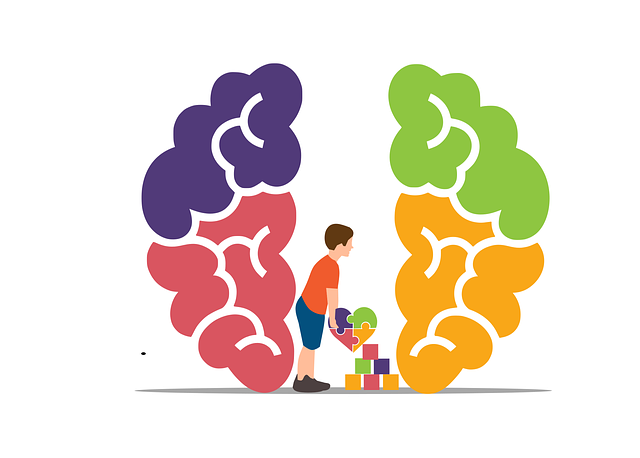Burnout among healthcare providers, particularly mental health professionals, is a growing concern fueled by high patient loads and stressful environments. Early identification through risk assessment is key; subtle behavioral changes like increased irritability or avoidance of responsibilities signal burnout, akin to Parker Oppositional Defiance Disorder (PODD) therapy symptoms. Proactive strategies including mind-over-matter principles, emotional healing processes, and support systems prevent burnout, ensuring consistent high-quality patient care. Integrating PODD therapy focuses on enhancing emotional intelligence and social skills training, addressing emotional challenges that impact well-being. Creating sustainable work environments with open communication, empathy, and emotional intelligence fosters a supportive atmosphere, reducing burnout especially for individuals managing conditions like PODD.
Healthcare provider burnout is a growing concern, impacting patient care and clinical outcomes. This article delves into effective strategies to prevent burnout among medical professionals. We explore the causes and consequences of burnout, focusing on early identification through red flags. Evidence-based approaches for clinical settings are discussed, highlighting the integration of mental health support, including Parker Oppositional Defiance Disorder (PODD) therapy. Additionally, organizational changes to create sustainable work environments are explored, emphasizing their role in reducing healthcare provider burnout.
- Understanding Burnout: Causes and Impact on Healthcare Providers
- Identifying Red Flags: Early Signs of Burnout in Medical Professionals
- Evidence-Based Strategies for Preventing Burnout in Clinical Settings
- Integrating Mental Health Support: The Role of Therapies like Parker Oppositional Defiance Disorder (PODD)
- Creating Sustainable Work Environments: Organizational Changes for Burnout Reduction
Understanding Burnout: Causes and Impact on Healthcare Providers

Burnout among healthcare providers is a growing concern, impacting not just individual well-being but also patient care and organizational productivity. It’s essential to recognize that burnout isn’t merely fatigue; it’s a complex state resulting from prolonged exposure to high-stress environments. Healthcare professionals often face demanding work schedules, emotional demands, and a constant need for coping with challenging situations, which can lead to feelings of exhaustion, cynicism, and reduced professional efficacy.
Understanding the causes is pivotal. High patient loads, administrative tasks, and a lack of control over one’s work environment contribute significantly. For mental health professionals specifically, factors like managing complex client cases, including those with oppositional defiance disorder (Parker Oppositional Defiance Disorder), can be particularly taxing. A comprehensive risk assessment for mental health professionals can help identify these risks early. By employing mind over matter principles and integrating emotional healing processes into their practices, healthcare providers can combat burnout. This proactive approach not only benefits individual practitioners but also ensures the provision of consistent and high-quality patient care.
Identifying Red Flags: Early Signs of Burnout in Medical Professionals

Burnout among healthcare providers is a growing concern, with many facing overwhelming workloads and high-stress environments. Recognizing the early signs is crucial for preventing this issue. Medical professionals often exhibit subtle changes in behavior and attitude before burnout becomes severe. These red flags include increased irritability or oppositional defiance—similar to symptoms seen in Parker Oppositional Defiance Disorder Therapy—and a growing sense of detachment from work, patients, or colleagues.
Health care workers may also start to avoid responsibilities, show decreased performance, or exhibit physical and emotional exhaustion. The Stress Management Workshops Organization emphasizes the importance of early identification to implement effective countermeasures. Inner strength development and positive thinking can be powerful tools in combating burnout, encouraging professionals to prioritize self-care and seek support when needed.
Evidence-Based Strategies for Preventing Burnout in Clinical Settings

In clinical settings, preventing burnout among healthcare providers is paramount for maintaining high-quality patient care. Evidence-based strategies play a crucial role in fostering resilience and promoting mental wellness. Integrating techniques such as Stress Management and Emotional Healing Processes into the workflow can significantly mitigate burnout risk. For instance, mindfulness practices and cognitive-behavioural therapy (CBT) have been shown to reduce stress levels and enhance emotional regulation among healthcare workers. Additionally, implementing Mental Wellness Coaching Programs offers personalized support, helping providers navigate challenges and develop coping mechanisms tailored to their unique needs.
One innovative approach gaining traction is incorporating elements of Parker Oppositional Defiance Disorder Therapy (or similar therapeutic models) to address underlying emotional conflicts or resistance. By encouraging open dialogue and providing a safe space for expression, these strategies can help healthcare providers process demanding work situations more effectively. Ultimately, combining evidence-based practices with tailored support systems creates a holistic approach to burnout prevention, ensuring clinical environments foster resilience and well-being.
Integrating Mental Health Support: The Role of Therapies like Parker Oppositional Defiance Disorder (PODD)

In the context of healthcare provider burnout prevention, integrating mental health support is paramount. Therapies like Parker Oppositional Defiance Disorder (PODD) play a crucial role in addressing emotional challenges that are often overlooked but significantly impact well-being. PODD therapy focuses on enhancing emotional intelligence and social skills training, essential components for healthcare professionals navigating demanding work environments. By fostering better understanding of their own emotions and those of others, healthcare providers can improve patient interactions and reduce stress.
This approach not only facilitates emotional healing processes but also empowers professionals to handle difficult situations with more resilience. In light of the high prevalence of burnout among healthcare workers, incorporating these therapeutic methods into support systems can help create a culture that prioritizes mental wellness alongside physical health.
Creating Sustainable Work Environments: Organizational Changes for Burnout Reduction

Creating sustainable work environments is a proactive approach to healthcare provider burnout prevention. Organizations can implement several strategic changes to reduce burnout rates among their workforce. One such method involves fostering a culture that prioritizes emotional well-being. This includes encouraging open communication, where providers feel comfortable discussing their challenges and concerns without fear of judgment or reprisal.
Additionally, implementing empathy-building strategies and promoting emotional intelligence can significantly contribute to a healthier work environment. These strategies may include regular team-building activities, peer support programs, and access to mental health resources. By fostering positive thinking and a sense of community, organizations can create a supportive atmosphere that enhances job satisfaction and reduces burnout. This is particularly important in managing conditions like Parker Oppositional Defiance Disorder (a behavioral disorder often requiring therapy), as it highlights the need for understanding and compassionate work settings.
Burnout among healthcare providers is a pressing issue, but with proactive strategies, it can be effectively mitigated. By recognizing early signs and implementing evidence-based practices, organizations can foster sustainable work environments that support mental health. Integrating therapies like Parker Oppositional Defiance Disorder (PODD) offers specialized care for professionals at risk. Through organizational changes that prioritize staff well-being, healthcare settings can reduce burnout rates, ensuring a healthier, more resilient workforce dedicated to quality patient care.














